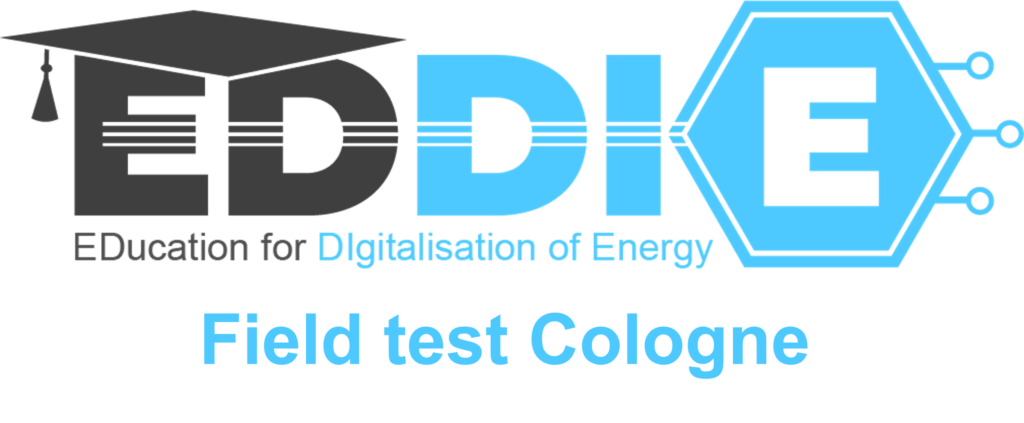Field Test Cologne
Overview
The piloting activities in Aachen are extended to a broader part of Germany and Europe, with additional pilots issued by the Institute of Energy Economics at the University of Cologne (EWI). The additional projects engages students, companies, and employees throughout Germany and Europe with different contents and addressees. The designed programs will align with the skills gaps identified in previous work packages and comprise various elements of the value chain of the Blueprint Strategy for the Digitalisation of the Energy (BSDE).
Field Test Cologne
The piloting activities in Aachen are extended to a broader part of Germany and Europe, with additional pilots issued by the Institute of Energy Economics at the University of Cologne (EWI). The additional projects engages students, companies, and employees throughout Germany and Europe with different contents and addressees

EWI Academy
The EWI Academy is a training program designed for companies that want to train their employees in the field of energy. The program consists of several modules on different contents of interest related to the digitization-driven transition of the energy sector. The addressees of the EWI Academy are companies, both on the supply- and demand-side, that are willing to offer training to their employees on different carrier stages. The programs’ modules are offered online and in-person, combining input sessions with active parts, such as discussions. Besides lectures, the courses can be accompanied by interactive workshop sessions. The modularized structure allows adjusting each training program content- and process-wise to the needs of the companies. E.g., the training can be held on a single day or in multiple day sessions. The training’s language is German or English. Participants receive a proof of certification.
Target Group = Companies interested in trainings for own employees
EQF Level = 4-5
Main stakeholders = EWI, Companies affected by energy transition and markets
Part/s of Blueprint Strategy tested = levers to reduce skills gaps, general templates, best practices
Contents = modularized lectures on different contents of the energy value chain; booked by companies as trainings for employees who are new to the energy domain or interested in trainings on specific topics:
- electricity value chain (basics)
- hydrogen economy (basics)
- e-mobility (basics)
- scenario generation (advanced)
- energy system modelling (advanced)
Certificate Programme Smart Energy – Mastering the Energy Landscape of the Future
The Gymnasium Workshop is a two-day workshop in a STEM group at a Gymnasium in Aachen. Students should get a first understanding of digitalization in the energy sector. This is achieved through interactive presentations and the use of the Lite Emulator of Grid Operations (LEGOS) demonstrator.
Target Group = Professionals with min. 3 years postgraduate work experience
EQF Level = 7
Main stakeholders = Prof. Marc-Oliver Bettzüge,
EWI, Cologne Business School
Part/s of Blueprint Strategy tested = levers to reduce skills gaps, to be discussed and determined.
Contents = Certificate programme for on different aspects of the energy sector’s digitization. Several modules (Energy Business, Smart Home, Smart city) and a capstone project.
Certificate in Future Energy Business
The Future Energy Business event series is designed to connect advanced students from all disciplines with current and relevant knowledge about the concrete transformation of the energy system. This will enable students to learn first-hand about the unique challenges and opportunities in the Future Energy Business and make their first contacts in this exciting industry.
Experts from science, public authorities and industry give interactive lectures and supervise practical projects on various topics of the energy industry, sustainability and digitalization. The events are usually held in the presence of the participants, partly at the Alte Wagenfabrik in Cologne-Ehrenfeld, partly on site at the participating partner companies. The events are thematically complementary. A certificate of attendance can be issued. If a minimum number of events (30 time hours (10x 3h) and practical project) are attended, a Certificate of Future Energy Business will also be awarded.
Target Group = Master Students
EQF Level = 6
Main stakeholders = Prof. Marc-Oliver Bettzüge, EWI, EWI e.V:, 13 companies from the energy field
Part/s of Blueprint Strategy tested = levers to reduce skills gaps, and others to be discussed and determined.
Results delivered to EC = Skills and knowledge levels will be in line with EQF frameworks
Contents = two-semester, flexible programme for students interested in energy; blend of theoretical contents on energy economics and relevant research methods combined with two practical projects in collaboration with energy companies.


